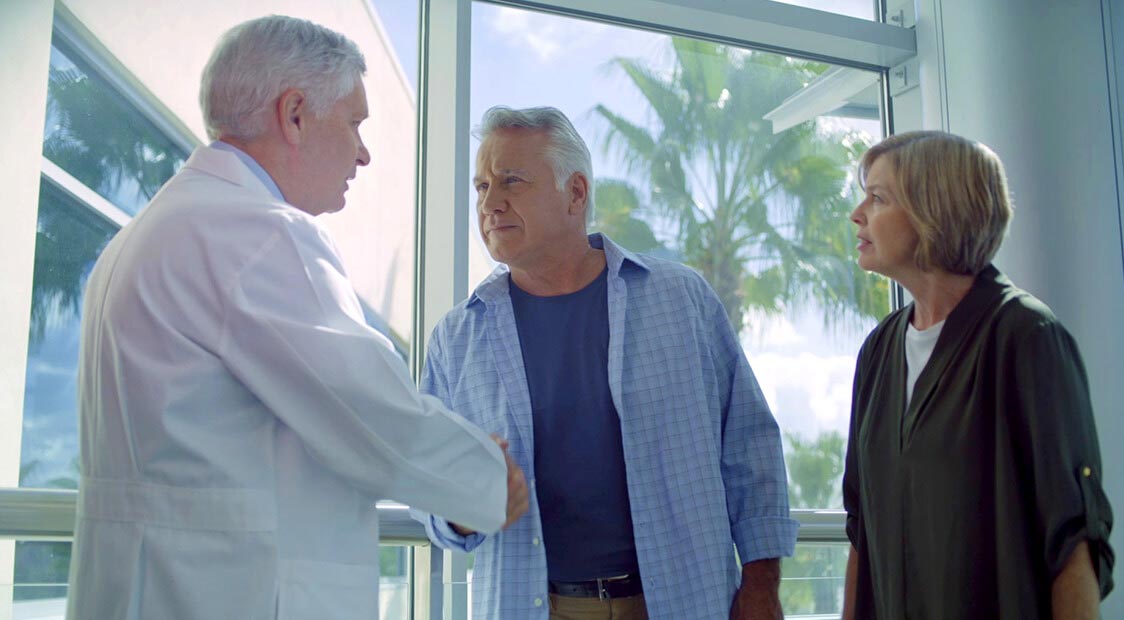Meet your cancer treatment team: the consultation process
By Christina L. Mershell
Share:

Being diagnosed with cancer is life-changing. After receiving your diagnosis and speaking with a specialist, you are likely to head home with a whirlwind of thoughts and emotions. You may begin researching your condition, exploring treatment options and trying to make sense of what to do next.
One treatment that may catch your attention is proton therapy, an innovative cancer treatment option that more precisely targets the tumor. The UF Health Proton Therapy Institute in Jacksonville, Florida says this treatment is “Harder on cancer. Easier on you.” But what is proton therapy, and how do you find out if it is right for you?
As a leader in cancer care, the Institute has a team of experts who will handle your cancer treatment with compassion as well as innovative cancer treatment methods.
Beyond the medical staff, there is a friendly, helpful and dedicated group of professionals that walks you through the entire process — from your first inquiry about proton therapy and the best treatment options for your cancer, to your consultation appointment, handling insurance and more.
Let’s meet this group of people who are here for you and your support group.
Patient Intake Coordinators: Your First Point of Contact
When you reach out to learn more about proton therapy, the person on the other end of the line is a patient intake coordinator. These compassionate and knowledgeable professionals specialize in helping patients navigate the initial steps of care. They explain what proton therapy is, gather your medical history and help determine if radiation treatment might be appropriate for your case.
They also assist in collecting your medical records — such as imaging reports, pathology results and insurance information — and guide you through completing necessary forms.
Once your records are reviewed by a radiation oncologist and you are considered eligible for consultation, your intake coordinator will schedule your appointment and provide all the details you need to prepare. Many patients feel a strong connection with their intake coordinator, often asking to meet them in person once treatment begins.
Billing and Authorization Specialists: Navigating Insurance
One of the most common questions patients ask is, “Is proton therapy covered by insurance?” Our billing and authorization specialists are here to help you find the answer.
After receiving your insurance details from the intake coordinator, this team verifies your benefits, checks medical policies and determines whether prior authorization is needed for your consultation.
An assigned specialist will contact you to explain your coverage, any out-of-pocket costs and next steps. Even if treatment is not covered, consultations often are. Our team will help you understand your options so you can make informed decisions.
Your Consultation Appointment: Meeting the Care Team
Your consultation day begins with a visit with a financial counselor, who reviews your insurance coverage and collects any required co-pays or deductibles. You also sign consent forms related to your care.
Next, you meet a medical assistant who takes your vitals and helps schedule future appointments. Then, a nurse case manager reviews your medical history and answers your general questions about the Institute and your care. These nurses are highly trained in radiation oncology and play a key role in coordinating your care.
The care team is led by a radiation oncologist — a physician who specializes in treating cancer with radiation. During the consultation, the radiation oncologist meets with you to review your case, ask follow-up questions and discuss your goals and preferences.
Based on this conversation and your medical records, they will recommend a cancer treatment plan, which may include additional testing and active surveillance or radiation therapy — potentially proton therapy or a combination of radiation and other treatment methods.
Behind the Scenes: Billing, Coding and Appeals
If radiation is recommended, your case returns to the billing team. An authorization specialist works with a medical coding specialist to ensure your diagnosis and treatment plan are accurately documented. This information is submitted to your insurance company along with a justification for medical necessity. Our main goal is to initially submit all possible documentation necessary to the insurance company in hopes to not delay patient care and have to proceed with the appeals process.
If coverage is denied, our appeals specialists step in. They collaborate with your care team to provide additional documentation, including letters of medical necessity and comparison plans to support your case. Throughout this process, you’ll be kept informed and supported every step of the way.
Preparing for Treatment: Oncology Treatment Coordinators
Once your consultation is complete, an oncology treatment coordinator will work with your team to schedule any additional testing, coordinate your CT simulation (used to plan your radiation treatment) and ensure everything is in place for your first day of therapy. These coordinators work closely with your nurse case manager to make sure your care is seamless and personalized.
Ready to Start Your Cancer Treatment
From your first phone call to your consultation appointment, a dedicated team of professionals is working behind the scenes to support you.
Each role — from intake to billing and clinical care — is designed to make your journey smoother, more informed and less overwhelming. Don’t hesitate to ask questions, seek support and lean on your team. You are not alone in this.
Stay tuned for the next blog in our series, where we'll walk you through what happens between your consultation and the start of treatment.
Learn more about proton therapy and talk to someone today at the UF Health Proton Therapy Institute.



